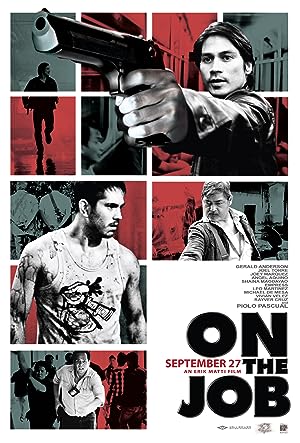On The Job focuses on two ambitious young men at the beginning of their career with mentoring father figures whom they admire and trust. One man is a cop who one day wants to be an elected official like his father in law, a congressman. This young cop is vulnerable because his career is shadowed by allegations that his father was a corrupt cop. Another man, a prisoner and apprentice assassin to a fellow inmate and more seasoned assassin, does not look at his mentor as a warning of what his future life will be, but is excited at his relationship with his future self and the opportunities that being an assassin affords him. Neither young man knows how connected they are to each other or how similar their lives will be. As their paths begin to cross, if you root for one’s success, it means the downfall of the other.
I am not familiar with many Filipino movies, but after seeing Graceland and On The Job, these cinematic masterpieces signal a gritty tragic realism worthy of Shakespeare where the criminal underworld, governing bureaucracy and political elites are intertwined. On The Job depicts a world where for generations, people attempt to end corruption or to achieve some modicum of success or reform only to be crushed by the gears of a machine that has existed and exploited their families and created the predicaments these men faced long before they were aware of it and will continue long after they are gone.
On The Job is spectacularly real, depressing and sad in the way that history erases at best or maligns at worst its crusaders for justice and casts villains as heroes. On The Job also suggests that the ones that you love and trust are the ones that have already ensnared and will ultimately destroy you. Corruption permeates all levels of society including the home. On The Job paints a pessimistic view of how even family does not provide sanctuary from the betrayals of the greater world.
On The Job provides a muted image of hope in the depiction of the failed career of the aging cop who never gets promoted or respect, who stays under the radar and just incrementally discovers the truth and plugs away faithfully at his job. He simply lives and bears witness to all, but fails to solve the case or save lives. Still he knows the truth. Despite all the forces arrayed against the truth, the entire story is known by one person, and that person survives within the bureaucracy of corruption, buried, but alive like a seed. Is it enough? On The Job leaves that part ambiguous. Only time will tell.
Do not let the subtitles dissuade you! Forget flashy crime genre films produced by Guy Ritchie or Quentin Tarantino. Filipino dramas such as On The Job are inspired by real life tales of corruption and are bleak, but desperately needed incisive critiques of our times to remind us to question the narrative told to us by our government when the government has more in common with the criminal underworld.
Stay In The Know
Join my mailing list to get updates about recent reviews, upcoming speaking engagements, and film news.





